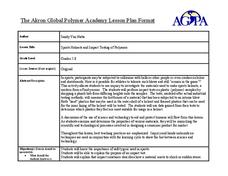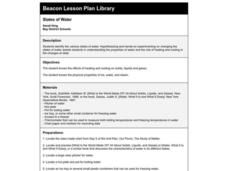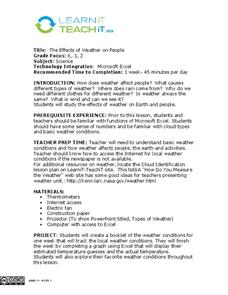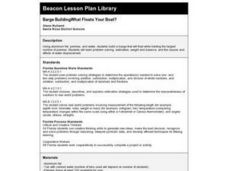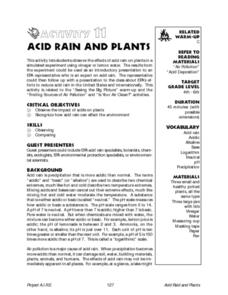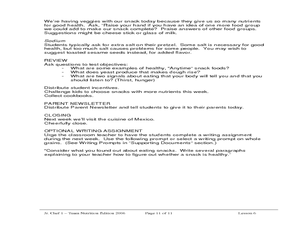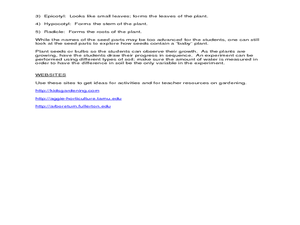Curated OER
Sports Helmets and Impact Testing of Polymers
Students examine the importance of good quality safety gear. In this investigative lesson, students will tests various polymers, collect data, and analyze the data to determine which polymer is best for safety helmets. They will design a...
Curated OER
Forces in Action
Second graders experiment to understand how force is effected by friction. In this forces in action lesson, 2nd graders view a website to simulate what happens when the height of a ramp is changed. Students participate in an...
Curated OER
Rep Tiles
Third graders use pattern blocks of one shape at a time to try to create a similar shape. They compare the perimeter of the new figure with the perimeter of the original shape and look for a pattern. Students use the pattern to predict...
Curated OER
Scaling Our School
Fourth graders practice estimating the length and height of buildings at their school. They then compare their estimations with the actual heights or lengths. Each student then builds a scale model using ratio to translate the "real"...
Pennsylvania Department of Education
Length and Perimeter
Third graders explore tessellations and the spatial concepts used in creating them. In this tessellations lesson plan, 3rd graders rotate, reflect and transform shapes to create tessellations. Students become familiar with...
Curated OER
Making Benchmards--Length
Students explore the idea of having Benchmarks to estimate the length of given objects. Students demonstrate acquired knowledge of the basic units of length by making reasonable estimates. Students create a personal benchmark.
Curated OER
STATES OF WATER
Students identify the various states of water. They use hypothesizing and hands-on experimenting on changing the states of water, the properties of water, and the role of heating and cooling in the changes of state.
Curated OER
Sublimation
Learners investigate sublimation and deposition using moth balls and toilet bowl freshener. In this sublimation lesson plan, students make a water bath and use two small beakers inside 2 larger beakers with moth balls in one and toilet...
Curated OER
Pressure and Volume of Gases
High schoolers investigate pressure and volume as they relate to gases. In this pressure and volume lesson plan, students observe multiple demonstrations related to air pressure. The develop an understanding of the relationship between...
Curated OER
The Effects of Weather on People
Students discover the causes of different types of weather and it's effect on society. In this environmental lesson plan, students utilize the Internet to examine cloud types, normal weather conditions and the type of weather...
Curated OER
Quilt Squared
Students study West Virginia quilts. In this mathematics lesson plan, students use symmetry, geometric shapes, and patterns to create their own quilt square.
Curated OER
Salinity
Students take a provided ocean Trivia Quiz in order to start a discussion of the ocean. They then perform an experiment on how the amount of salt in the ocean affects it and varies from ocean to ocean.
Curated OER
Geoboard Squares
Young scholars create squares of different sizes on a geoboard. They find and describe a pattern. Students use the pattern to determine the number of squares possible on a 10-by-10 geoboard. They create squares with a horizontal base...
Curated OER
Classification
Students explore the observable properties of matter and utilize them in classification. They use a binary classification system to divide objects, then justify their scheme.
Curated OER
Bacterial growth
Students explore the exponential growth and decay of microbial populations in relation to the organism tolerance ranges in their environment, They observe the impact of changing variables which can affect microbial populations.
Curated OER
Combustion In a Test Tube
High schoolers investigate a combustion reaction. In this combustion lesson plan, students mix dry yeast with hydrogen peroxide in a test tube. They place a glowing splint in the test tube and observe the combustion reaction as the...
Curated OER
Weather Walks
Students study weather by taking walks in various types weather conditions.
Curated OER
Barge Building: What Floats Your Boat?
Students construct aluminum foil boats that float while holding the greatest number of pennies. They investigate the concept of water displacement, record their results, and watch a Bill Nye video on buoyancy.
Curated OER
Acid Rain And Plants
Students observe the effects of acid rain on plants. They simulate an experiment using vinegar or lemon water. They observe the impact of acids on plants and recognize how acid rain can affect the environment. They examine their plants...
Curated OER
What Plants Need in Order to Survive and Grow: Soil
Young scholars conduct an experiment to evaluate whether plants need soil to survive and grow. They plant two seeds, one with soil and one without, make predictions, and record and analyze the seed germination results on a worksheet.
Curated OER
Why is it so hot when I sit next to the window?
Students investigate how energy travels through glass. In this energy usage lesson plan, students conduct an experiment in which they decide if window film affects how much energy travels through the glass. Students use a journal to...
Curated OER
Using the Synoptic Code for the Prediction of Weather
Students interpret the synoptic code. They construct a thermoscreen with an anemometer. Students identify different types of clouds and understand and read barometric pressure. Students predict weather pattern as they apply to fronts.
Curated OER
Jr. Chef Club Super Snacks Lesson 6
Students explore healthy snacks. In this nutrition and cooking lesson, students observe and identify food groups on USDA's MyPyramid food guide. Students discuss how fiber helps our digestive system and follow a recipe using yeast to...
Discovery Science Center
Kindergarten Observing, Comparing and Contrasting
Although this is a science instructional activity, it can be adapted to help meet Common Core standards in math as well. Starting scientists describe physical properties of objects and explore three forms of water. To address the Common...
